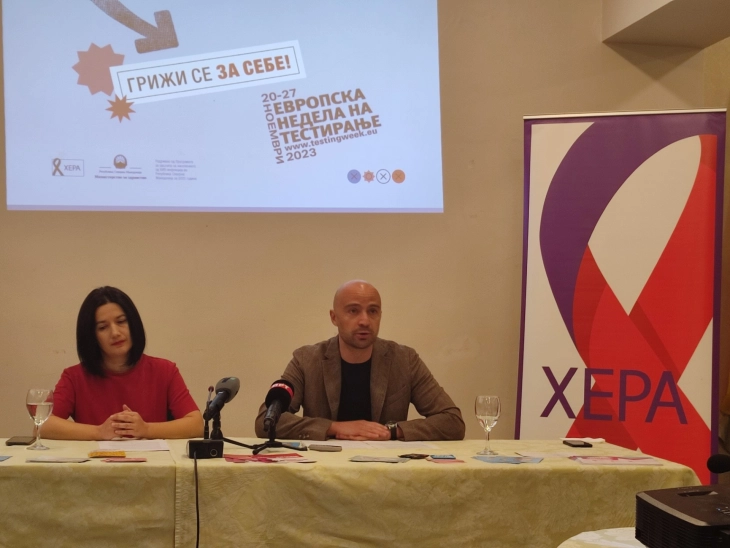Week-long campaign to provide free testing for HIV and other sexually transmitted diseases
- In 2023, the Skopje-based Clinic for Infectious Diseases registered 46 cases of HIV, 41 of which are receiving regular antiretroviral medication. One third of cases were discovered during the later stages of infection, said representatives of the Clinic and the HERA – Health Education and Research Association, at a press conference Sunday held ahead of the beginning of the "Look After Yourself" campaign marking European Testing Week and Men's Health Awareness Month. Free testing for HIV and other sexually transmitted diseases will be provided from November 20 to November 26 as part of the campaign.

Skopje, 19 November 2023 (MIA) – In 2023, the Skopje-based Clinic for Infectious Diseases registered 46 cases of HIV, 41 of which are receiving regular antiretroviral medication. One third of cases were discovered during the later stages of infection, said representatives of the Clinic and the HERA – Health Education and Research Association, at a press conference Sunday held ahead of the beginning of the "Look After Yourself" campaign marking European Testing Week and Men's Health Awareness Month. Free testing for HIV and other sexually transmitted diseases will be provided from November 20 to November 26 as part of the campaign.
The campaign aims to encourage men and boys to get tested for HIV if they are at risk or preventively, regardless of the population group they are a part of.
Dr. Velimir Saveski from the Clinic for Infectious Diseases, said men make up most of the HIV-positive cases registered in 2023. However, unlike previous years when most cases were among men who have sex with men, according to the doctor, this year there is a trend of HIV infections among the heterosexual population as well.

Dr. Saveski and Vesna Matevska, program manager at HERA, called for efforts to raise awareness and overcome taboos related to tests for sexually transmitted diseases, stressing that prevention is the best and cheapest tool.
“Because medication which ensures a normal life and an average lifespan exists, provided that the infection is identified on time. The issues emerge when the patient shows up with symptoms which perhaps aren’t recognized at first, gets tested, the possibility of an HIV infection is considered, and then we discover that the patient has a late-stage infection, i.e., AIDS. Then treatment is more difficult, sometimes hospitalization is required, and sometimes patients end up in the ICU,” said Dr. Saveski.
He said sexual and reproductive health should receive the same amount of attention as health in general.
“Women and girls are more open when it comes to this topic because the system has already established some kind of care for them, since there are personal gynecologists who look after female sexual and reproductive health, while male sexual and reproductive health is still a taboo unfortunately. This should change once and for all, and we need to normalize testing for HIV and other sexually transmitted diseases,” said Saveski.
Saveski said the Clinic provides confidential testing for HIV, and anyone can get tested anonymously.

HERA’s program manager Vesna Matevska said the Association’s youth centers have provided testing for HIV and various sexually transmitted diseases for the last 17 years. The centers also provide free condoms, contraception, and rapid HIV tests, while the set of services that will be provided during the coming week will also include free testing for syphilis, gonorrhea and chlamydia.
Matevska pointed to the need of more funds for prevention, and emphasized the importance of education.
“Education and raising awareness is an additional thing that we can do, because the facts state that 36 percent of young people who are sexually active don’t use protection, don’t use condoms. That’s why we also need sexual education from an early age. It would also contribute to the ‘detabooization’ of these topics,” said Matevska.
Photo: MIA







